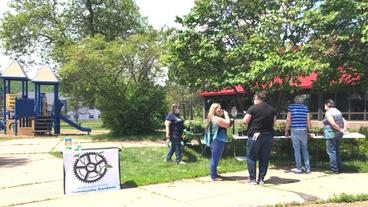Residents of the Steve O’ Neil Apartments, a long-term supportive housing complex, are participating in Healthy Lives Day at UMD’s Land Lab this Saturday, October 30, 2021. The intergenerational programming for moms and their children starts at 10:30 a.m. and concludes at 3 p.m. at the Land Lab, 3566 Riley Road.
Highlights of the schedule include:
11:30 a.m. Farm tour
12 p.m. Lunch prepared in part with food grown at the Land Lab
1 p.m. Stations– i.e. cooking healthy dishes, fermentation, activities for kids, and planting seeds to take home
UMD students made the day possible by organizing transportation to the Land Lab, preparing the farm for the event, harvesting ingredients, and planning workshops and a healthy lunch at noon.
Local growers are joining the families, including Growing Together (Duluth), Sweetland Farm (Cloquet), Diaspora on Madeline Island, and Sarah Foltz-Jordan, a conservation biologist with the Xerces Society.
Growing Healthy Food Accessibility

The Steve O’ Neil participants are members of the First Ladies of the Hillside, whose focus is improving their community.
This, says Teresa Bertossi, Land Lab director and assistant professor of Environment & Sustainability, dovetails perfectly with the Land Lab’s mission and research.
After receiving a University of Minnesota “Healthy Foods, Healthy Lives” grant, Bertossi is leading efforts related to healthy food accessibility in our community. Specifically, she and her students are looking at how local food systems can support both farmer and consumer.
Their research revealed that local growers are interested in the opinions of residents in healthy food priority areas, like the Steve O’Neil Apartments, when it comes to what should be grown and how to get the food to them more efficiently.
“We also found that interactions, like the ones we’re fostering at Healthy Lives Day, help build relationships with local growers, and this is more impactful than health and nutrition campaigns when it comes to making healthier eating choices,” says Bertossi, explaining that a relationship between a farmer and a lower income resident motivates the resident to support the grower when possible because they know them and their family.